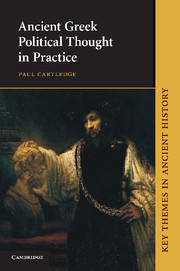Book contents
- Frontmatter
- Contents
- Preface
- Acknowledgements
- Timeline
- CHAPTERS AND NARRATIVES
- 1 Meaning in context: how to write a history of Greek political thought
- 2 The Greek invention of the polis, of politics and of the political
- Narrative I The prehistoric and protohistoric Greek world, c. 1300–750 BCE
- 3 Rule by one: the politics of Homer, c. 750 BCE
- Narrative II The archaic Greek world, c. 750–500 BCE
- Narrative III The classical Greek world I, c. 500–400 BCE
- Narrative IV The classical Greek world II, c. 400–300 BCE
- Narrative V The Hellenistic Greek world, c. 300–30 BCE
- Narrative VI ‘Graecia capta’ (‘Greece conquered’), c. 146 BCE – CE 120
- APPENDIX I Selected texts and documents
- APPENDIX II The ‘Old Oligarch’: a close reading
- Bibliographical essay
- References
- Index
3 - Rule by one: the politics of Homer, c. 750 BCE
Published online by Cambridge University Press: 05 June 2012
- Frontmatter
- Contents
- Preface
- Acknowledgements
- Timeline
- CHAPTERS AND NARRATIVES
- 1 Meaning in context: how to write a history of Greek political thought
- 2 The Greek invention of the polis, of politics and of the political
- Narrative I The prehistoric and protohistoric Greek world, c. 1300–750 BCE
- 3 Rule by one: the politics of Homer, c. 750 BCE
- Narrative II The archaic Greek world, c. 750–500 BCE
- Narrative III The classical Greek world I, c. 500–400 BCE
- Narrative IV The classical Greek world II, c. 400–300 BCE
- Narrative V The Hellenistic Greek world, c. 300–30 BCE
- Narrative VI ‘Graecia capta’ (‘Greece conquered’), c. 146 BCE – CE 120
- APPENDIX I Selected texts and documents
- APPENDIX II The ‘Old Oligarch’: a close reading
- Bibliographical essay
- References
- Index
Summary
The best reason why Monarchy is a strong government is that it is intelligible government. The mass of mankind understand it, and they hardly anywhere in the world understand any other.
(Walter Bagehot, The English Constitution, 1867)Monarchy runs like a red thread through Greek political history and thought (see also chapter 8). It was never normal or normative, though. Herodotus indeed (2.147) throws scorn on the Egyptians for their seemingly congenital incapacity to live without kings. There again, though, the same might be said of the – wholly Greek – Spartans, whose odd double kingship reminded Herodotus precisely of non-Greek royalty (Egyptian, Persian, Scythian) (see further chapter 10). The fact that there were always two Spartan kings, however, reigning jointly, from two different royal houses is, in a way, exactly the exception that proves the rule. The concentration of power that full-blooded monarchy represented was always at bottom felt to be incompatible with the fundamental polis principles of freedom and equality.
If the wanax of Mycenaean times is put on one side, the continuous story of Greek kingship begins in Homer; but the Homeric epics are as slippery as a historical source as they are outstandingly brilliant as literature. Was there a single ‘Homeric society’, locatable in a specific time and place, and, if so, when and where? If there was, what were its politics? Where, to put it more bluntly, is the polis in Homer? Alternatively, and perhaps more accurately, how was the political dimension expressed therein?
- Type
- Chapter
- Information
- Ancient Greek Political Thought in Practice , pp. 29 - 40Publisher: Cambridge University PressPrint publication year: 2009



